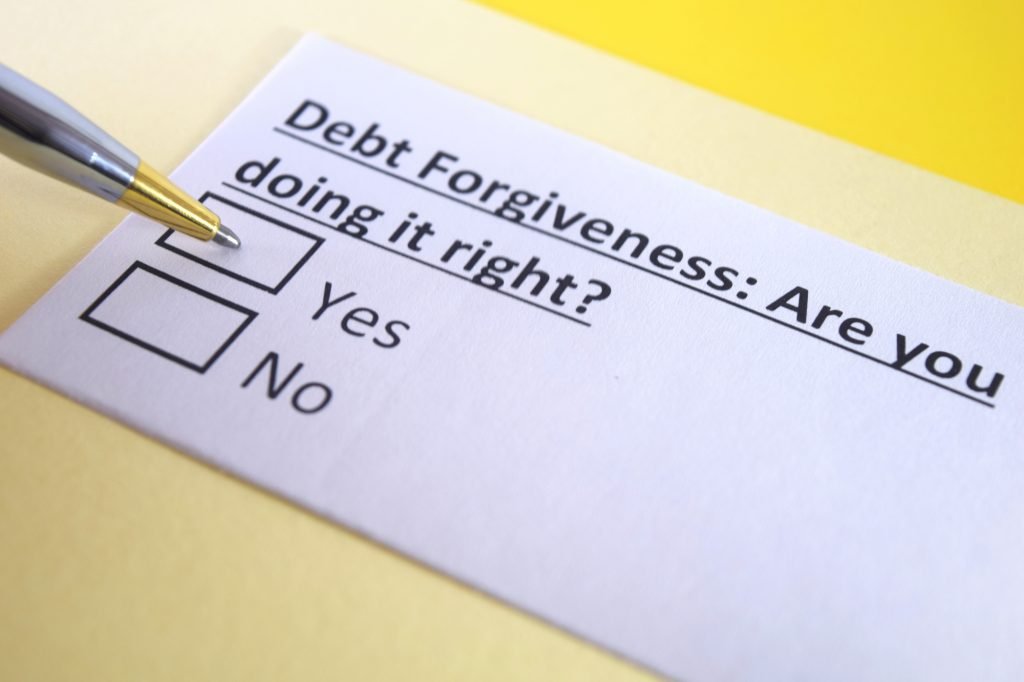Drowning in debt might be one of the most stressful predicaments you can experience in your life. Aside from the inability to pay, creditors will be pressuring you to pay your due obligations. This situation is not a pleasant one. How can one prevent or recover from insolvency? Perhaps you've heard of the term “debt forgiveness.”
At first glance, it sounds good. Of course, being forgiven for your debts is a big relief for the debtor. But, is it the best solution? If debt forgiveness is indeed the only or best way out, why do not more people use this remedy? Or if someone used it, did it work to their advantage?
In this article, you’ll learn more about debt forgiveness. We’ll also explore the details about this remedy. And we’ll answer the question, “how does it work?”
What Is Credit Card Debt Forgiveness?

Debt forgiveness is the creditor’s voluntary act to release the debtor from obligation to pay the latter’s debt. When someone forgives your debt, that someone must signify their intention and action to forgive your debt. As a general rule, you can never assume or imply forgiveness and definitely when anything agreed is only verbal.
For formality’s sake, debt forgiveness often comes with an agreement wherein the creditor and debtor agree to condone the debt. It is a gratuitous contract (a contract benefitting only one of the parties) and is done out of the generosity of the creditor.
Since debt forgiveness releases a party from an obligation to pay the debt, it must be in writing to make the agreement clear to both parties. To make the forgiveness of debt enforceable, the debtor must accept, and such acceptance must be in writing. The debtor’s signature in the debt waiver agreement is construed as express acceptance.
Why does it need to be in writing? It’s because debt forgiveness is a form of donation where the creditor releases the debtor from his obligations as an act of liberality. It is as if the creditor gave the debtor money and expects no repayment from it.
However, the same case would not apply for debt forgiveness on banks or other establishments. Lawyers will be involved in that matter if the amount of debt is substantial. But, there will be instances when companies will naturally write off your debt. If you’ve received a debt forgiveness letter before, that means that the company has forgiven your debt voluntarily.
Here’s the overview of the process:
- Send a letter of request for debt forgiveness addressed to the creditor. Check out the sample template here.
- Negotiate with the creditor.
- Finalize the debt waiver agreement.
- Notarize (signed by a notary public) the document.
How Credit Card Debt Forgiveness Works

STEP 1: Send A Letter To The Creditor
The letter that you need to send to the creditor is a letter of request for debt forgiveness. Mainly, you’ll tell the creditor to cancel your debt. However, you must provide a reason why you need it. Below are some possible reasons with its corresponding proof:
- Lingering medical conditions like physical disability making you unable to sustain employment – attach a medical certificate signed by your physician along with other medical records like tests or body scans.
- Mental incapacity (e.g., insanity) or mental illnesses (e.g., depression, anxiety) making gainful employment difficult or impossible – attach a medical certificate signed by a psychiatrist.
- Financial incapacity – attach proof of income (e.g., payslips) and expenses (e.g., bills, dues) showing that your monthly income barely sustains your needs or an affidavit stating your financial situation.
STEP 2: Negotiate The Terms Of The Debt Waiver
The creditor will surely contact you to discuss the matter. If this is a personal loan, expect the creditor to contact you personally. If not, a representative of the company will reach out to you. Assuming the creditor considers debt forgiveness, always be open to what they have to say. If this debt is of a substantial amount, consider bringing a lawyer with you to keep everything within legal confines.
STEP 3: Finalize The Debt Waiver By Execution Of An Agreement
Once the creditor agrees to the total cancellation of the debt, there must be a debt waiver agreement signed by both parties. The basic information included in this agreement are, but is not limited to, the following:
- Names of the debtor(s) and creditor(s) or the entities they represent (e.g., company, business, practice of profession).
- Amount of the debt.
- The amount that the debtor paid prior to debt forgiveness.
- Date of execution and effect.
- Signature of the parties
Check out this sample debt waiver agreement.
STEP 4: Notarize The Document
Notarization (signed by a notary gives the debt agreement more credibility. The notary will ensure that all information in the document is true and reflects the intention of the parties. Moreover, the notary will look for signs of coercion with the signers.
In this case, the creditor might’ve coerced you to agree to some terms just to grant debt forgiveness. But ultimately, notarization makes the document official and makes the agreement clear to both parties.
What Causes Credit Card Companies to Forgive My Debt?

A credit card company may forgive a part or all of your debt for different reasons.
- If the credit card company considers your debt uncollectible or considers writing it off because you have stopped making monthly payments and your account has become seriously delinquent.
- If you offer a debt settlement of your delinquent debt at a lesser amount, the creditor may agree to forgive your remaining balance instead of suing you.
What percentage will credit card issuers settle for? It depends on whether you’re negotiating with the original creditor or a collection agency. Generally, a creditor may accept at least 40% to 50% of your debt.
When Is Credit Card Debt Forgiveness a Good Option?
Credit card debt forgiveness should only come to your mind if you’re behind on your credit card payments and you think you won’t be able to catch up. Under the Credit Card Debt Relief Act 2010, consumers are allowed to settle their credit card for less than the amount they owe. It also prevents debt settlement companies from collecting upfront fees.
A better time to consider this option is before your creditor charges off your account. At this point, your creditor is likely to accept a debt settlement involving a reduction in payment and forgive part of your debt.
The best time to seek credit card debt forgiveness is when your creditor sells your unpaid debt to a collection agency. Debt collectors purchase your debt for a fraction of the amount you owe, so they’re more likely to accept a debt settlement where you make a partial payment and they forgive the rest of the amount you owe.
What Are the Consequences of Credit Card Debt Forgiveness?
Credit card debt forgiveness will affect your credit especially if it’s only partially forgiven. If your creditor accepts your offer to settle your debt at a lesser amount, it will appear as a negative mark on your credit report. Meanwhile, the statement government and the IRS may consider the amount that was forgiven as a taxable income, which means you have to pay taxes on it.
What are the Pros and Cons of Credit Card Debt Forgiveness?
Debt forgiveness is a viable and possible option. However, there are several pros and cons to this option.
Pro #1: Avoid Bankruptcy
When you are unable to pay and file bankruptcy, you’ll have to involve the courts so that you’ll be declared bankrupt. The bankruptcy process is long, tedious, and costly. But with simple forgiveness, you and the creditor will not go through a lengthy legal process just to settle a debt.
Pro #2: Release From Obligation To Pay
Condonation of debt wipes out an obligation to pay the loan. In other words, if the creditor forgives your debt, it is as if it was already paid. Thus, you’ll no longer be obliged to pay, and the creditor cannot demand payment anymore.
Con #1: Incurrence Of Additional Tax Payments
As stated earlier, any forgiven amount is constituted as income on your part. You have to report that to the IRS if you don’t want any trouble with them. In this scenario, your tax dues will be higher than ordinary.
Con #2: Dependent On Creditor’s Liberality
Debt forgiveness will work if the creditor wholeheartedly grants it. In this case, the creditor must not mind the amount unpaid. But the odds of that happening are low. Of course, creditors are also people with lives to live and resources to manage. Forgiving debts is not an easy thing to do unless the creditor is rich.
How Is Debt Forgiveness Different From Debt Relief?

Debt relief is partial forgiveness of debt unlike debt forgiveness, wherein the creditor releases the debtor from payment of the debt thereon. In the case of debt relief options, the creditor only eases or relieves the debtor from the burden of payment by:
- Reducing the principal amount
- Increasing the payment period (e.g., from 2 years to 4 years)
- Decreasing the interest rate
- Waiving the imposition of interest rate
- Repayment holidays wherein the creditor postpones collecting monthly dues for a certain period so that the debtor can recover.
If you’re not willing to condone the debt wholly, it does not fall within the debt forgiveness definition. Instead, it’s debt relief.
FAQs About Credit Card Debt Forgiveness

Is credit card debt forgiven after seven years?
Credit card bureaus will drop off negative marks linked to unpaid credit card debt after seven years, which means late payments linked to that account won’t affect your credit score any longer. However, unpaid credit card debt isn’t forgiven after this duration.
How can I legally get rid of my credit card debt?
There are other ways to get rid of your credit card debt. Get rid of any unnecessary expenses and use the money to pay off your debt, instead. You can also look for a different source of income. You may also seek help through a credit counseling program, debt management, debt settlement, and even bankruptcy.
Does credit card forgiveness affect credit score?
When your debt from a commercial lender is forgiven, your credit score will remain intact. Since it is at the creditor’s liberality to release you from obligation, it would NOT affect your credit score. If it’s debt relief, such a thing will impact your credit score.
If debt forgiveness releases you from the obligation to pay, why isn’t it a common option?
If you remember, debt forgiveness is an act of liberality and generosity on the creditor’s part. Thus, you must convince the creditor to do such a thing. However, it’s easier said than done. Naturally, creditors would want to recover their money. That’s why more often they would opt for debt relief rather than forgiveness.
Can creditors reverse a debt waiver?
Sometimes, there will be incidents that will put the debtor in a difficult position. For example, a creditor who already forgave the debtor’s debt comes back to the debtor later to ask for repayment. Or perhaps, a creditor who didn’t collect his dues from the debtor suddenly tries to make a collection after a long time. What shall the debtor do?
In legal concepts, there is a principle called “estoppel.” Estoppel is a legal device that courts use to prevent a person from asserting his right because of his previous actions or statements. In simplest words, the creditor cannot collect your debt anymore if he had forgiven it before. Therefore, it’s irreversible.
What is the statute of limitations on collecting debt within states?
Creditors are only allowed to file a collection lawsuit for a certain period provided by the law. These periods differ per State. The statute of limitations protects debtors from unscrupulous creditors who intentionally collect at a later date to benefit from higher interest charges. However, it also protects creditors from debtors who abscond or escape to avoid payment of the debt. Check out this website to see the statute of limitation for your state.
What are the tax consequences of forgiven debt?
So, let’s say Casey is happy that Lily forgave her debt. But, does that mean that she’s free from any other obligation. Well, the Internal Revenue Service (IRS) is particular about this matter. According to IRS Publication 4681, canceled debt is generally part of your ordinary income. The IRS guidelines require you to report only the canceled portion.
Should You Ask For Debt Forgiveness?
You’ve seen a lot of debt forgiveness examples above. But, should you go for it? In a practical sense, there’s no harm in asking. The major factor that you need to consider here is the creditor’s approval. Personal creditors or commercial lenders may hesitate to forgive a loan with a substantial amount. However, as long as you are true to your intentions, there’s no harm in asking for it.
Overall, debt forgiveness is not a totally adverse option to get away from debt and have a better financial future. Just make sure that you’re ready for possible repercussions like additional tax payments and rejection from the creditor, especially in the case of a personal loan from friends or family. It may even damage a personal relationship for good.
If you’ve experienced negotiating for debt forgiveness before, share your experience in the comments section below.







